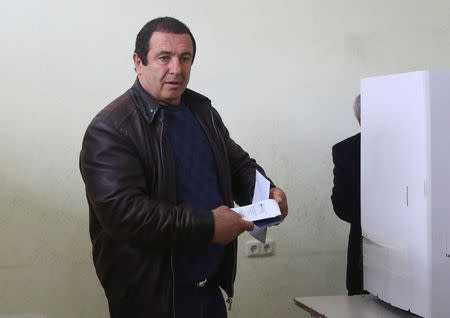Ruling party in Armenia leads parliamentary vote
By Hasmik Mkrtchyan YEREVAN (Reuters) - President Serzh Sarksyan's ruling Republican Party led in elections in Armenia on Sunday, official preliminary results showed, laying the foundation for a new parliamentary system of government. The Republican Party of Armenia (RPA) had 53.20 percent of the votes, while the opposition Tsarukyan's Alliance led by wealthy businessman Gagik Tsarukyan got 26.56 percent. The government-loyal Dashnaktsutyun Party had 8.07 percent, enough for the party to enter parliament. Partial results were posted on the Central Election Commission's website and based on results from 18 percent of the polling stations. Under constitutional changes critics say were designed to prolong Sarksyan's political life after his final presidential term ends next year, the presidency will become largely ceremonial. Power passes to the prime minister. Sarksyan, the 62-year-old leader of RPA, has repeatedly denied that the changes, approved in a December 2015 referendum, were made to allow him to retain power in the former Soviet republic. An exit poll by Baltic Surveys/The Gallup Organization, reported by Armenian television shortly after polls closed, put RPA at 46 percent of votes cast, with Tsarukyan's Alliance at 25 percent and Dashnaktsutyun at 5 percent. Republicans and Dashnaktsutyun, coalition partners in the current parliament, are likely to create a coalition again, getting the right to name the future prime minister, who is expected to be incumbent Prime Minister Karen Karapetyan. Sarksyan has been president since 2008. Under the new system, critics say, he could keep wielding executive power by becoming prime minister in 2018, stay active by remaining leader of the RPA or quit politics but keep exercising influence through a handpicked successor. Many Armenians accuse the government of corruption and of mishandling the troubled economy. Armenia depends heavily for aid and investment on Russia, which has been hard hit in the past three years by an economic downturn. Armenia has felt the impact, with growth falling to 0.2 percent last year from 3.0 percent in 2015. International observers will present their conclusions on the election on Monday. (Writing by Margarita Antidze; Editing by Mary Milliken and Peter Cooney)


